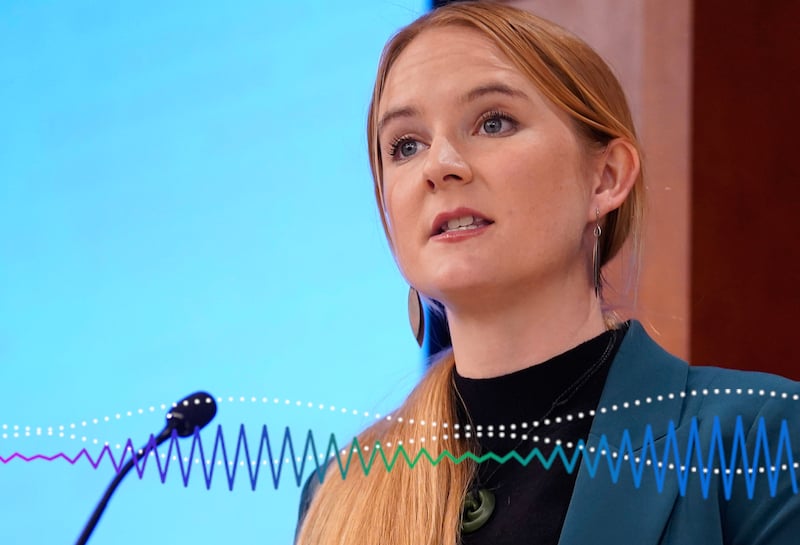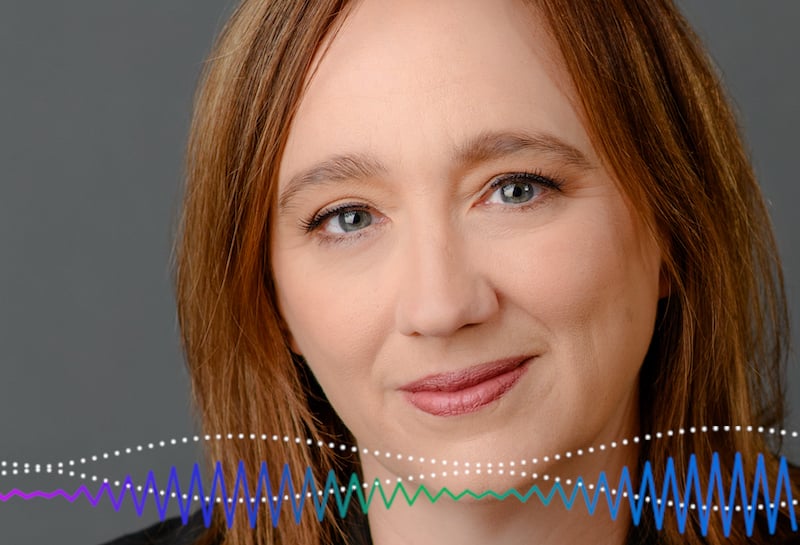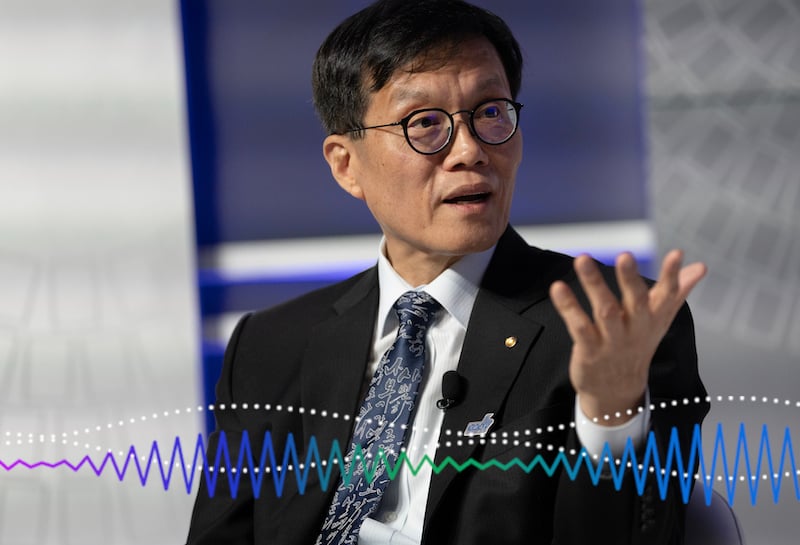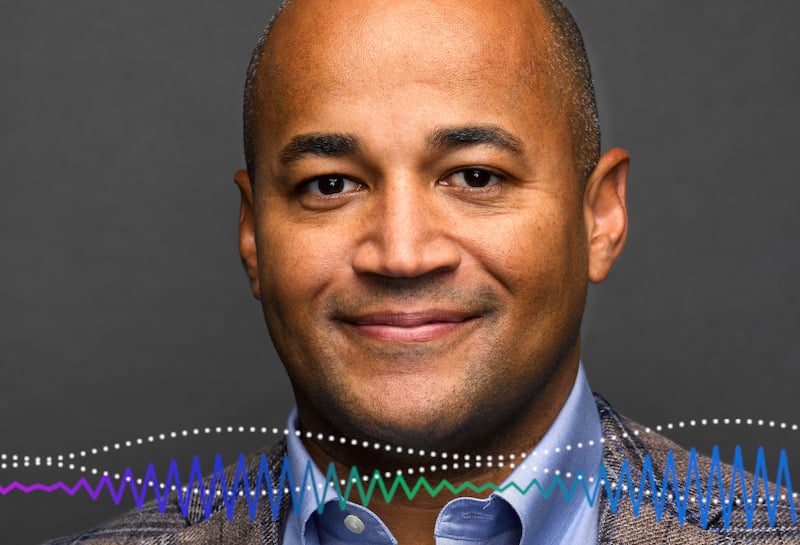
Blockchain’s Peter Smith: The Promise of Virtual Currency Systems
In This Episode
Blockchain technology is a shared, public ledger of transactions that everyone can inspect but not subject to any form of central control. And while it offers potential for a variety of applications, its most famous is providing the platform for virtual currencies like bitcoin. Peter Smith is co-founder and CEO of Blockchain, and in this podcast, he talks about the evolution of crypto currency financial systems and what it could mean for big data analytics. Smith was the keynote speaker at the IMF’s Fifth Statistical forum on Measuring the Digital Economy.
Hello, I’m Bruce Edwards and welcome to this podcast produced by the International Monetary Fund. In this program: Blockchain’s cofounder Peter Smith talks about the evolution of cryptocurrency financial systems and what it could mean for big data analytics.
MR. SMITH [soundbite]: You can monitor flows in real time; you can monitor shifts in the ecosystem in real time; you can monitor a company’s performance in real time, and I think that’s going to be very powerful. And, by the way, I think it will have society impacts, both good and bad.
MR. EDWARDS: Blockchain technology is a shared public ledger of transactions that’s open to inspection, but not subject to any form of central control. While it offers potential for a variety of applications, it’s most famous at this point in providing the platform for virtual currencies like Bitcoin.
Peter Smith is the founder and executive director of Blockchain, and was the keynote speaker at the IMF’s fifth Statistical Forum on Measuring the Digital Economy.
So, why is Blockchain so well suited for the financial sector, do you think?
MR. SMITH: So, I think that one of the big scenarios of cost in financial services is around settlement, and basically sitting on risks as transactions clear, in the sense that when I pull out my phone and send you some money from my HSBC account to your Bank of America account, it’s going via a bunch of different systems, it’s going to take a few days, and there’s going to be a bunch of risks and expenses in that.
Whereas, if I use Blockchain or distributed ledger—digital currency, primarily—I can pull out my phone, you can pull out your phone, and we can settle the transaction directly between the two of us very inexpensively in the space of about 20 minutes.
MR. EDWARDS: But, what is different about the Blockchain platform than simply paying for something using your phone and your bank account?
MR. SMITH: Well, one, as I mentioned, is that speed, right? But, what’s more interesting about it are two other characteristics: the first is that it allows to you do transactions across low trust environments. So, you and I we both bank at banks we trust—I trust Bank of America; you trust HSBC—but what if I’m sending money to someone in Pudong Province, or I’m sending money to somebody in Indonesia who doesn't even have a bank account? It enables you to have this sort of global money protocol.
So, today we don’t have a global money protocol. We have money and we have hundreds of thousands of protocols that try to move the money, but we don’t have a global money protocol.
The second thing that is powerful about it is, because the infrastructure is so cheap, because six guys in a basement can spin up a Blockchain, it means that we can put a lot of new assets on a Blockchain. It means that we can digitize new assets.
So, it means that we can digitize new forms of equity; new forms of debt; new forms of risk pooling. It means that we can finance self‑driving car fleets much more efficiently. I think that stuff is really exciting.
The last thing—and this is kind of part of that—is it allows you to build assets that are unique and kind of new. Bitcoin’s a great example of that. Before Blockchain, you couldn’t build Bitcoin. What’s powerful about Bitcoin is that it’s an algorithmically governed form of money.
So, central bank policy is now very unpredictable, for partly justifiably reasons. The monetary policy of Bitcoin or Ethereum is algorithmically set at the creation of the asset. I think that's a really powerful idea, because it allows people to opt out of their financial system that they're born into.
So, if you’re someone and you're born into America you’ve really won the lottery, because you’ve been born into the most powerful, stable financial system in the world. But, if you’ve been born in Venezuela, or you’ve been born in any other country that deflates and has banking crises and runaway currency losses, you may want to opt out of that national system and into a system that, while may be frontier stage and volatile at this point in time, at least goes in the right direction generally.
MR. EDWARDS: Most people would associate Blockchain with Bitcoin, but it goes beyond Bitcoin, right? Your platform can provide services to all these other cryptocurrencies that are on the market?
MR. SMITH: Right. So, we support a lot of cryptocurrencies on our consumer platform today. I think even beyond that we're still very early stages as an industry, because if you look at maybe where the internet was or where modern medicine was six years in, they’re just beginning to discover what you can do.
I think that similarly, we’re just beginning to discover what we can do, and that over the next ten years, we’re going to find out a lot of these things and there’s going to be some big failures and there’s going to be some big successes, but it’s going to be a really exciting process of discovery where maybe, maybe [we’re] one percent of the way in.
MR. EDWARDS: So, is there any regulation‑‑ is there any oversight in these transactions that are happening now on your platform, and do central banks get involved in this, are they interested in this technology?
MR. SMITH: So, our industry has only recently hit a $200 billion market cap. Anything that has $200 billion is probably not very interesting to a major central bank, because they’re managing many multiples of that, and that’s where they’re focused. Right now, it’s a very risky time in global financial markets, so they’re quite busy. So, I think they monitor it more on a technology level than on a transactional flow risk level.
Then, in terms of regulation, we do work with regulators around the world. The digital currency ecosystem is actually pretty regulated, and most countries have figured out common sense ways to regulate the market.
MR. EDWARDS: Given that central banks have been at the very root of the financial system for so many years and it is very central that they have central control of money flows—and sort of the whole reason behind Blockchain is to decentralize systems, if I understand this correctly? So, what do you think the chances are of the global economy adopting cryptocurrency without there being some kind of major disruption?
MR. SMITH: I think that people forget that central banks really change every 20 to 30 years. So, if you look at what a central bank was doing in 1995 compared to what it was doing today, it’s almost a totally different function in the economy. If you look at what a central Bbnk was doing in 1960 versus 1975, it’s a totally different function in the economy. Central banks, despite having a reputation of being very conservative, are actually one of the more flexible and dynamic government institutions. Of course, government institutions change very slowly, but comparatively they’re quite dynamic and flexible.
I think what central banks are likely to do here is use the technology to their advantage. They’re likely to adopt it where they see fit. I think they will adapt as the market changes around them-- if in fact this does get to a point where they even have to adapt.
I think what you could see develop, is not our technology or our ecosystem replacing the current existing financial system, but building a separate supplemental system that people can opt into.
So, I think that it’s quite likely that we won’t be in a situation where, say, global financial services in 2020 is a $20 trillion market. I don’t think it’s necessarily the case that we’re going to be $10 trillion and legacy is going to be $10 trillion and we’ve taken a bunch of their market share.
I think what’s more likely is that people’s predictions are wrong and there will be a $20 trillion legacy system, and there will be an $8 trillion new system.
Maybe there’s some overlap. Maybe we take a little bit of market share from them, but I think it’s going to be more about the creation of this sort of new alternative system than it is going to be about the destruction of the legacy system.
MR. EDWARDS: Do you talk much with central bankers?
MR. SMITH: All the time. I find it really interesting on an academic level.
MR. EDWARDS: So, I’ve heard you speak about “monetary velocity.” I have to admit that we don’t hear a lot about monetary velocity in this building, or at least I have not! Tell me a bit about how that works and how Blockchain technology fits into that?
MR. SMITH: Monetary velocity is just literally how fast money moves around the economy. There’s a whole body of research on it. I’m no expert, but where Blockchain and digital currencies are exciting is that it increases velocity. So, when I was talking earlier about sending money from HSBC to Bank of America, it takes actually three days to settle that in the banking system today versus with a digital asset we can do it in 20 minutes—maybe even less, maybe five minutes, depending on what we used.
Now, it means that that money is immediately available to you, which means the velocity of the money is much higher. So, if you can increase the velocity of the money, you can increase economic growth and that’s what people are excited about.
So, the Bank of England has done some interesting research here where they estimate that if they moved 30 percent of UK transaction volume to a digital currency—a digital pound—they could increase economic growth by three or four percentage points for GBP, just by increasing monetary velocity and decreasing transaction costs.
Three or four percent GDP growth sounds small, but to a central bank economist, three or four percent is like a bonfire—it’s massive, and it would effectively eliminate unemployment in the UK.
MR. SMITH: So, today you spoke to a group of economists, a lot of whom work in the statistics department here at the IMF. What would adoption of Blockchain technology, or something similar, do to the collection of data generally?
MR. SMITH: I think it’s going to make it easier for people to collect data, because all of these transactions are published to you—open records and open Blockchains—which means that there’s a lot of big data analytics that you can do that's really powerful—very interesting.
You can monitor flows in real time; you can monitor shifts in the ecosystem in real time; you can monitor a company’s performance in real time, and I think that’s going to be very powerful. And, by the way, I think it will have society impacts, both good and bad.
MR. EDWARDS: Why do you think part of it would be bad?
MR. SMITH: I think there’s always a balance between privacy and having data to make great decisions. This goes way back to the census, which as you know we now accept the census as a fact of life and noncontroversial.
But when they first rolled out the census in the US, they had some parts of the country that nearly revolted. And there’re households that didn’t participate in the census, because they didn’t want the government to count them; they didn’t want the government to know they existed; they didn’t want the government to know how many people actually live in this northwest corner of Kentucky. So, there’s this balancing act that goes back to the very beginning of collecting data between privacy and liberty and being able to have data that enables us to make better choices, like how many people should be in the House of Representatives.
I think there’s always this balance, and it’s hard to predict how that balance changes over time, particularly for us, because we’re working on frontier technology, and a frontier market, and we won’t understand a lot of the impact of this stuff until we’re looking at it in reverse.
MR. EDWARDS: Thank you very much.
MR. SMITH: Thank you.
MR. EDWARDS: That was Peter Smith, founder and executive director of Blockchain, talking about the promise of virtual currency financial systems. You can watch the webcast of Smith’s keynote speech at the IMF’s fifth Statistical Forum at imf.org.
If you like this podcast, subscribe on iTunes or on your favorite podcast app, just search for “IMF Podcasts.” You can now also follow us on Twitter: @imf_podcast.
Join Us on Every Major Platform
Latest Podcasts
BEHIND THE MIC

Bruce Edwards
International Monetary Fund
Bruce Edwards produces the IMF podcast program. He's an award-winning audio producer and journalist who's covered armed conflicts, social unrest, and natural disasters from all corners of the world. He believes economists have an important role in solving the world's problems and aspires to showcase their research in every IMF podcast.

Rhoda Metcalfe
RHODA METCALFE is an independent journalist and audio producer.










